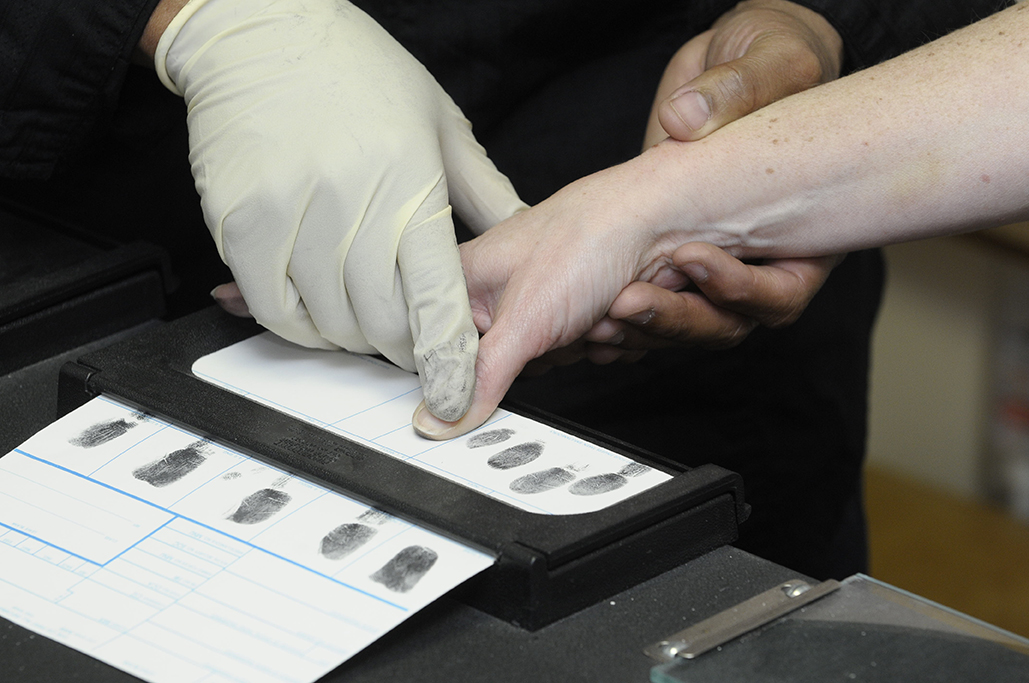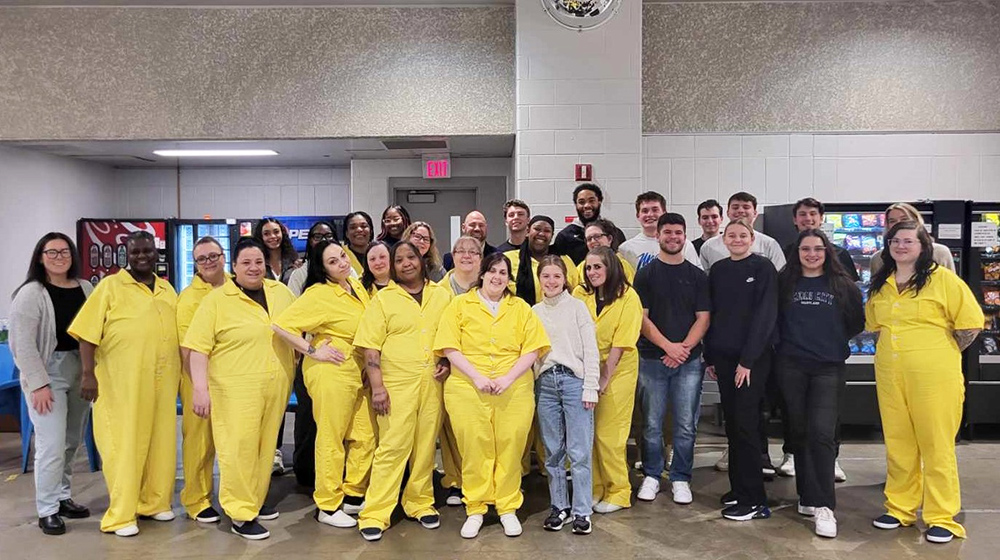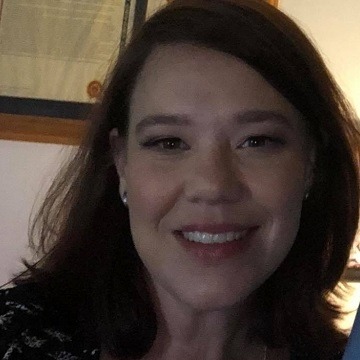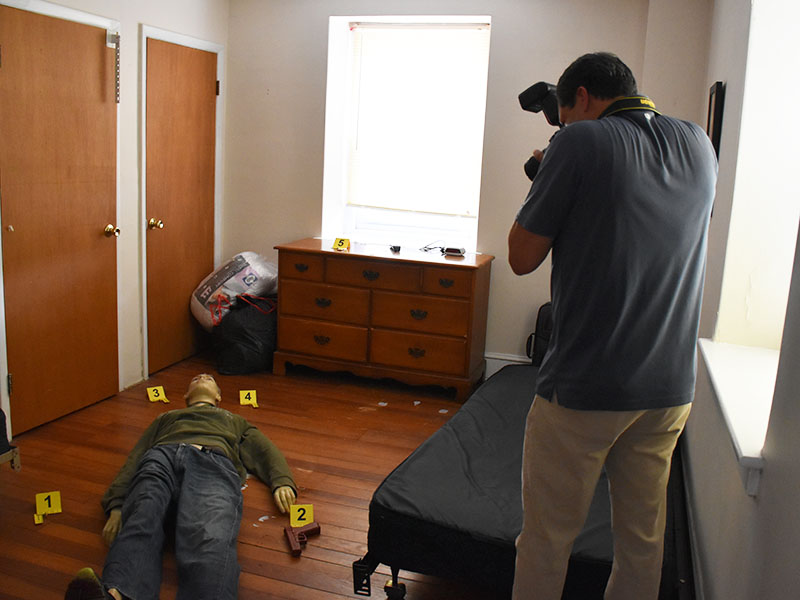Criminal Justice Major: Bachelor of Science Degree in Criminal Justice
 Learn to investigate an active crime scene, break down a drug conspiracy, or examine the behavior of a sexual predator.
Learn to investigate an active crime scene, break down a drug conspiracy, or examine the behavior of a sexual predator.
GMercyU’s Bachelor of Science degree in Criminal Justice combines innovative classroom and experiential learning.
You'll explore patterns of criminal behavior, the philosophy of punishment for crimes, and the American legal system. You’ll learn to identify and analyze crimes using criminological theory, forensic science, and the latest in crime scene investigations.
Our degree will prepare you for law school, graduate school, or immediate entry into careers in the public or private sector – whether in government, law enforcement, corrections, probation and parole, private security, or social justice and advocacy. No matter what your path, you’ll learn how to make a positive impact in your community.
-
60
credits of Criminal Justice courses, the most comprehensive program of its kind in Pennsylvania
-
100%
of Criminal Justice majors complete internships that best suit your career goals (our faculty help place you with an organization)
-
100%
of full-time undergraduate GMercyU students receive some form of financial aid
Program Details
 Featuring 60 credits of Criminal Justice courses, ours is the most comprehensive, thorough criminal justice program in Pennsylvania, so you can dive deep into a specific interest within the field or discover the right path for you.
Featuring 60 credits of Criminal Justice courses, ours is the most comprehensive, thorough criminal justice program in Pennsylvania, so you can dive deep into a specific interest within the field or discover the right path for you.
Here, you will benefit from:
The exciting new Crime Scene House (CSH), a three-story home that's been transformed into the ultimate hands-on simulation lab. Here, students can build their skills and confidence as they assume the role of crime scene investigator.
Small classes with GMercyU’s low 10:1 student-to-faculty ratio, taught by experts in the field – no teaching assistants.
A close-knit, supportive, and motivated community with professors who provide career mentorship and are invested in your success.
A transformational experience with GMercyU’s Inside-Out Prison Exchange Program® (see more below), which will challenge your viewpoints and offer you a new perspective on the criminal justice system.
Regional criminal justice leaders as guest speakers. Former Philadelphia Police Commissioner Charles H. Ramsey visited campus to discuss the importance of a college education before entering the police force, while world-renowned criminologist Dr. Jack Levin spoke to GMercyU students about serial killing and mass murder.
The chance to earn your Act 120 – an essential step to becoming a police officer – during your senior year as part of your four-year degree at no extra cost, unlike other criminal justice programs. (See more on this below.)
The chance to present your own research at GMercyU’s annual University Research Conference.
The Griffin Edge program, to learn how to connect the dots between your GMercyU experiences and your future aspirations, so you can ace future job interviews and launch a successful career.

GMercyU’s Inside-Out Prison Exchange Program® brings incarcerated and non-incarcerated students together as peers for weekly meetings at the Federal Detention Center of Philadelphia.
Created in 1997 and brought to GMercyU in 2019, The Inside-Out Prison Exchange® is an international educational program created to inspire social change through dialogue and collaboration.
The program offers GMercyU “outside” students the unique experience to meet “inside” students of the correctional facility and exchange thoughts and perspectives about social inequalities, prison reform, and restorative justice.
Students have described it as a life-changing experience.
“Realizing there’s another group of people just like you who were incarcerated because of different life circumstances is a truly transformative experience for students and instructors alike," says GMercyU Associate Professor and Criminal Justice Program Coordinator, Patrick McGrain, PhD. "You can’t get this kind of experience in the classroom or even through an internship.”
Thanks to Dr. McGrain and Peter Lawrie, Associate Warden at the Federal Detention Center, in Philadelphia, “inside” students can now also earn college credits. “Offering inside students college credits recognizes that education is one of the pillars of rehabilitation,” said Dr. McGrain. Read more about this new best practice here.
Watch the video below to learn more:
As a GMercyU Criminal Justice major, you have the option of attending the Montgomery County Police Academy at the Montgomery County Community College. Here, you can earn your Act 120, an essential step in pursuing a career as a police officer.
Once you are accepted into GMercyU's Criminal Justice Program, this special training is offered during your senior year as part of your four-year degree without extended time or expense, unlike other criminal justice schools.
To learn more, see the "Montgomery Community College" tab of our Partnerships page.
In addition to General Education requirements, students seeking a criminal justice degree must complete the following courses:
Major requirements
| CRJ 102 | Introduction to Criminal Justice |
| CRJ 215 | Criminology |
| CRJ 216 | Race, Class, and Ethnicity |
| CRJ 220 | Ethics in Criminal Justice |
| CRJ 225 | Juvenile Delinquency |
| CRJ 250 | Police & Law Enforcement in America |
| CRJ 251 | Victimology |
| CRJ 310 | Introduction to Criminal Justice Research |
| CRJ 320 | Forensics: Crime Scene Investigation |
| CRJ 326 | Criminal Procedures |
| CRJ 327 | Criminal Law |
| CRJ 370 | Corrections |
| CRJ 405 | Criminal Investigation |
| CRJ 410 | Courts in America |
| CRJ 435 | Criminal Justice Internship |
| CRJ 4000 | CRJ Capstone |
| CRJ Electives | 4 Criminal Justice Electives: Cultural Criminology; Stalking & Domestic Violence; Violence & Criminal Justice; Sexual Deviance; Wrongful Convictions; Organized Crime; Terrorism & Hate Groups; White Collar Crime; Inside-Out Prison Exchange Program®, Serial Killers |
Credit Requirements
A minimum of 120 credits is required for the bachelor’s degree in Criminal Justice.
Undergraduate Minors
Increase the value of your degree as a criminal justice major by adding an undergraduate minor that best suits your personal and professional goals.
 Wondering what your classes will look like as a Criminal Justice major? Here are a few highlights.
Wondering what your classes will look like as a Criminal Justice major? Here are a few highlights.
CRJ 205 Stalking and Domestic Violence
You will look at the social factors that contribute to the incidence and prevalence of both stalking and domestic violence and examine victim outcomes and the criminal justice response to these crimes.
CRJ 303 Sexual Deviance
You will study the characteristics and development of sexual deviance, as well as examine the criminological, psychological, and physiological components of addiction. Specialized offenders such as pedophiles, juvenile offenders, and cyberstalkers are examined, with the hope of shedding light on how these perpetrators operate and how to spot them.
CRJ 304 Wrongful Convictions
This course will cover the causes of wrongful convictions. You will also examine the role system variables play in such convictions such as police line-ups, expert testimony, witness preparation, judicial discretion, and jury bias.
CRJ 311 Organized Crime
This course is a study of the many facets of organized crime. The theoretical explanations behind organized crime groups will be examined. You will build and operate your own organized crime syndicate, then utilize the criminal justice system to dismantle your syndicate.
For all criminal justice program course descriptions, please refer to the undergraduate catalog.
 Patrick McGrain, PhD
Patrick McGrain, PhD
Position: Program Director and Associate Professor, Criminal Justice
Did You Know? Professor McGrain is co-author of the book Inside the Minds of Social Predators.
Read bio

Lorraine Phillips, PhD
Position: Assistant Professor, Criminal Justice
Did You Know? One of Professor Phillips’ focuses is the intersection of psychology and law.
Read bio
 NEW: Crime Scene House
NEW: Crime Scene House
The ultimate hands-on learning lab
New for Fall 2025, the Criminal Justice program's Crime Scene House (CSH) is where students assume the role of crime scene investigator as they learn to gather fingerprints, collect and analyze forensic evidence, serve warrants, and other skills.
Each room in this three-story house represents a different crime — murder, sexual assault, drug use, and others. The CSH includes a Blood Spatter Room, an Interrogation Room, a Flop House, and more.
Real-World Opportunities
The program requires an internship, as they often lead to job offers for our students. Dr. Lorraine Phillips works with all Criminal Justice majors to find internships that best suit your career goals, taking advantage of our local and national alumni connections. Our students have recently interned at these organizations and more:
- Abington Police Department
- ATF Field Office
- Bucks County Adult Probation/Parole Department
- Bucks County Juvenile Probation
- City of Philadelphia: Office of Forensic Science
- Day Break Drug Treatment Ready
- Federal Public Defender, Camden NJ
- GMercyU Public Safety Department
- Lansdale Police Department
- Montgomery County Department of Corrections
- Montgomery County Detective Bureau
- Montgomery County Department of Probation and Parole
- Montgomery County Prosecutor’s Office
- Montgomery County Youth Center
- Norristown Police Department
- Pennsylvania State Police
- Philadelphia Department of Probation & Parole
- Philadelphia District Attorney’s Office
- Philadelphia Justice Center
- Philadelphia Police Department Crime Scene Unit
- Pottstown Police Department
- Target – Department of Loss Prevention
- Upper Dublin Police Department
- U.S. Department of Homeland Security
- Warrington Police Department
GMercyU Criminal Justice alumni have recently made their mark at these organizations and more:
- Abington Police Department
- ATF Field Office
- Bucks County Juvenile Probation Bucks County Clerk of Courts, Criminal Division
- Hatboro Police Department
- Lansdale Police Department Mission Kids Child Advocacy Center
- Montgomery County Clerk of Courts
- Montgomery County Department of Corrections
- Montgomery County Department of Probation and Parole
- Norristown Police Department
- Pennsylvania State Police
- Philadelphia Department of Probation & Parole
- Philadelphia District Attorney’s Office
- Philadelphia Police Department Crime Scene Unit
- Pottstown Police Department SEPTA Police Department
- Target – Department of Loss Prevention
- Upper Dublin Police Department Upper Moreland Police Department
- U.S. Department of Homeland Security
- Walmart – Loss Prevention Unit
- Warrington Police Department
Earning a BS in Criminal Justice can lead you to an exciting and well-paid career that enables you to serve your community in a meaningful way. Here are just a few of the many opportunities you could pursue.
Attorney
Description: Work as a public defender or district attorney or pursue the type of law that most appeals to your interests and passions.
Degree Requirements: A bachelor’s degree, followed by a degree in law.
Average Salary: In 2024, the annual average salary nationwide was $151,160.
Source
Criminal Investigator
Description: Put your analytical skills to use as a police detective or private investigator as you work on criminal cases and gather evidence to be used in court.
Degree Requirements: A bachelor’s degree.
Average Salary: In 2024, the annual median salary nationwide was $52,370 per year, with the highest 10% earning more than $98,770.
Source
Probation Officer
Description: Help keep criminal offenders who are on probation on the right path by regularly meeting with them, monitoring them, and arranging social services for them. You’ll also document everything for the court.
Degree Requirements: A bachelor’s degree.
Average Salary: In 2024, the annual median salary nationwide was $64,520, with the highest 10% earning more than $106,290.
Source
More Possible Careers for Criminal Justice Majors
- Body Guard
- Border Patrol Agent
- CIA Agent
- Community Service Coordinator
- Compliance Manager
- Corrections Officer
- Deportation Officer
- Detective
- Drug Enforcement Agent
- FBI Agent
- Firefighter
- Juvenile Court Counselor
- Law Enforcement Officer
- Paralegal
- Parole Officer
- Police Detective
- Private Investigator
- Secret Service Agent
- Social Worker
- State Police Officer
- Substance Abuse Counselor
- Teacher
- US Marshall
*This is only a partial list and not meant to limit you. Some of these careers may require additional education.
Choose a Minor
Take cybercrime and cybersecurity courses with a Computer Science Information minor. Or earn a minor in Psychology to better understand human behavior.
Scholarships
GMercyU offers dozens of scholarships and grants to help you save on a great education. They do not need to be repaid and generally are renewable each year.
Transfer
GMercyU grants up to 90 qualifying credits toward a bachelor's degree and offers renewable transfer scholarships and grants ranging from $11,000 to $21,000 a year.









